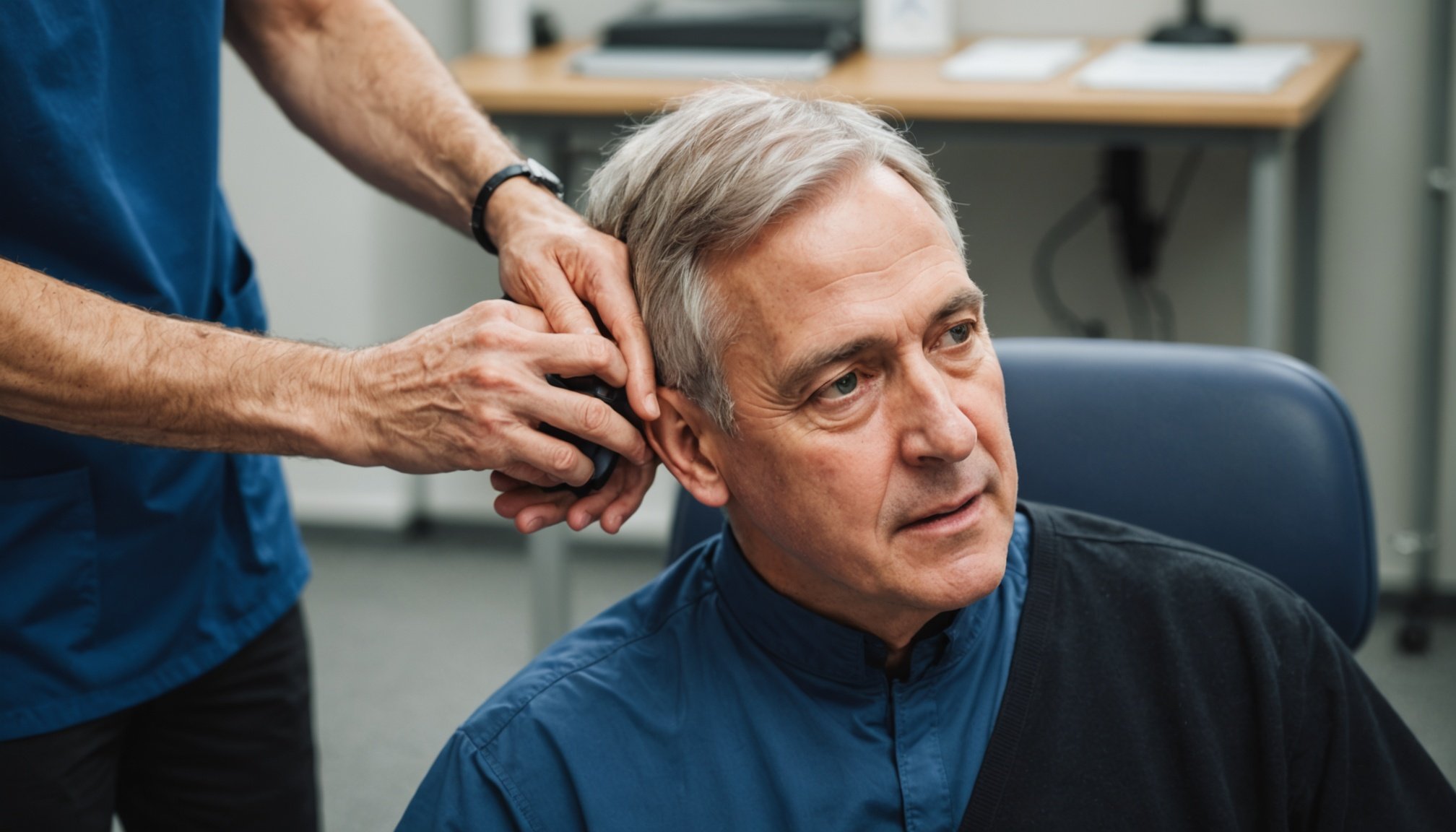Unlocking Recovery: The Role of UK Neuropsychologists in Stroke Rehabilitation
Understanding the Impact of Stroke
When a stroke occurs, it can have a profound impact on an individual’s life, affecting not only their physical abilities but also their cognitive and emotional well-being. The brain, a complex and delicate organ, can suffer significant damage, leading to a wide range of symptoms from memory loss and language difficulties to emotional changes and behavioral issues.
“Stroke can be a life-altering event, but with the right support and rehabilitation, many patients can make significant recoveries,” notes Professor Steven Kemp, a Consultant Clinical Neuropsychologist with extensive experience in brain injury and neurological disorders[1].
Also read : Tackling the Rise of Childhood Anxiety: Strategies for UK Pediatricians to Make a Difference
The Role of Neuropsychologists in Stroke Rehabilitation
Neuropsychologists play a crucial role in the rehabilitation process of stroke patients. Here’s how they contribute:
Neuropsychological Assessments
Neuropsychological examinations are a cornerstone of stroke rehabilitation. These assessments involve a detailed clinical interview and a battery of tests designed to evaluate cognitive functioning, neurobehavioral functioning, and psychological functioning.
Additional reading : Empowering COPD Management: Innovative Non-Pharmacological Strategies for UK Pulmonologists
- Cognitive Functioning: Assessing memory, concentration, attention, and other cognitive abilities to understand the extent of the brain injury.
- Neurobehavioral Functioning: Evaluating personality and behavioral changes that may have resulted from the stroke.
- Psychological Functioning: Identifying psychological issues such as post-traumatic stress disorder (PTSD), anxiety, depression, and adjustment difficulties[1].
Psychological Treatment and Therapy
Neuropsychologists provide psychological treatment tailored to the individual needs of stroke patients. This can include:
- Cognitive Behaviour Therapy (CBT): Helping patients manage psychological symptoms such as anxiety and depression.
- Cognitive Rehabilitation: Implementing strategies to improve cognitive functions like memory and concentration.
- Psychosocial Adjustment: Supporting patients and their families in adjusting to the changes brought about by the stroke[1].
Multidisciplinary Approach to Rehabilitation
Stroke rehabilitation is not a solo effort; it involves a multidisciplinary team of professionals working together to ensure comprehensive care.
Team Members and Their Roles
- Neuropsychologists: Conduct neuropsychological assessments, provide psychological treatment, and develop cognitive rehabilitation plans.
- Occupational Therapists: Help patients regain daily living skills and adapt to any physical limitations.
- Physical Therapists: Focus on improving physical mobility and strength.
- Speech and Language Therapists: Address communication and swallowing difficulties.
- Nurses and Medical Staff: Provide ongoing medical care and support.
Here is a detailed list of the roles and responsibilities of each team member:
- Neuropsychologists
- Conduct comprehensive neuropsychological assessments
- Develop and implement cognitive rehabilitation plans
- Provide psychological treatment for post-stroke psychological issues
- Participate in multidisciplinary team meetings to coordinate care
- Occupational Therapists
- Assess and improve daily living skills
- Adapt home environments for safety and accessibility
- Teach compensatory strategies for cognitive and physical deficits
- Physical Therapists
- Improve physical mobility and strength
- Enhance balance and coordination
- Reduce the risk of falls
- Speech and Language Therapists
- Address communication difficulties
- Improve swallowing functions
- Enhance language skills
- Nurses and Medical Staff
- Provide ongoing medical care
- Monitor and manage medical conditions
- Educate patients and families on post-stroke care
Neuroplasticity and Recovery
One of the most promising aspects of stroke rehabilitation is the concept of neuroplasticity – the brain’s ability to reorganize itself by forming new neural connections.
“Neuroplasticity is a powerful tool in recovery. By engaging in targeted therapies and activities, patients can stimulate their brain to adapt and compensate for damaged areas,” explains Dr. Ainger, a neuropsychologist involved in the clinical neuropsychology fellowship program at the University of Kentucky[2].
Practical Insights and Actionable Advice
For those navigating the complex journey of stroke rehabilitation, here are some practical insights and actionable advice:
For Patients and Families
- Stay Informed: Educate yourself about the effects of stroke and the rehabilitation process. Resources like Google Scholar and PubMed can provide valuable information.
- Engage in Therapy: Active participation in physical, occupational, and speech therapies can significantly enhance recovery.
- Support Network: Build a strong support network of family, friends, and support groups to help cope with the emotional and psychological aspects of recovery.
- Lifestyle Changes: Adopt healthy lifestyle changes such as a balanced diet, regular exercise, and stress management to support overall health and recovery.
For Healthcare Professionals
- Multidisciplinary Collaboration: Ensure that all members of the rehabilitation team are working together to provide comprehensive care.
- Personalized Treatment Plans: Develop treatment plans that are tailored to the individual needs and goals of each patient.
- Continuous Training: Stay updated with the latest research and training in stroke rehabilitation to provide the best possible care.
Real-Life Examples and Anecdotes
To illustrate the impact of neuropsychologists in stroke rehabilitation, let’s consider a real-life example:
Case Study:
Mrs. Johnson, a 65-year-old retired teacher, suffered a severe stroke that left her with significant cognitive and physical impairments. She was unable to speak clearly and had difficulty with memory and concentration. With the help of a neuropsychologist, she underwent a comprehensive neuropsychological assessment that identified her specific cognitive and psychological needs.
The neuropsychologist developed a personalized cognitive rehabilitation plan that included CBT to manage her anxiety and depression, as well as cognitive training to improve her memory and concentration. Through regular sessions with occupational and physical therapists, Mrs. Johnson gradually regained her ability to perform daily tasks and improved her physical mobility.
“Within six months, Mrs. Johnson was able to return to her favorite hobby, gardening, and even started volunteering at a local school. Her recovery was nothing short of remarkable,” said her neuropsychologist.
Scholarly Research and Future Directions
Research in stroke rehabilitation is ongoing, with scholars exploring new and innovative approaches to enhance recovery.
Current Projects and Initiatives
- Sanders-Brown Center on Aging: Conducting research on dementia and aging-related cognitive decline, which can inform strategies for stroke rehabilitation.
- Spinal Cord and Brain Injury Research Center: Investigating new treatments for brain injuries, including those resulting from stroke.
- UK Multidisciplinary Concussion Program: Studying concussion and its implications for brain health, which can provide insights into post-stroke cognitive rehabilitation[2].
Here is a comparative table highlighting some of the key research initiatives and their focus areas:
| Research Initiative | Focus Area |
|---|---|
| Sanders-Brown Center on Aging | Dementia, aging-related cognitive decline |
| Spinal Cord and Brain Injury Research Center | New treatments for brain injuries |
| UK Multidisciplinary Concussion Program | Concussion, brain health |
| UK Stroke Affiliate Network | Comprehensive stroke care, from acute to community settings |
The role of neuropsychologists in stroke rehabilitation is pivotal. Through comprehensive assessments, personalized treatment plans, and multidisciplinary collaboration, neuropsychologists help stroke patients navigate the complex journey of recovery.
As Professor Kemp aptly puts it, “Recovery from a stroke is a journey, not a destination. With the right support and care, many patients can regain a significant quality of life and continue to live fulfilling lives.”
By understanding the impact of stroke, the role of neuropsychologists, and the importance of a multidisciplinary approach, we can better support stroke survivors and their families. Whether you are a patient, a family member, or a healthcare professional, the insights and advice provided here can help unlock the full potential of recovery in the face of this challenging condition.











